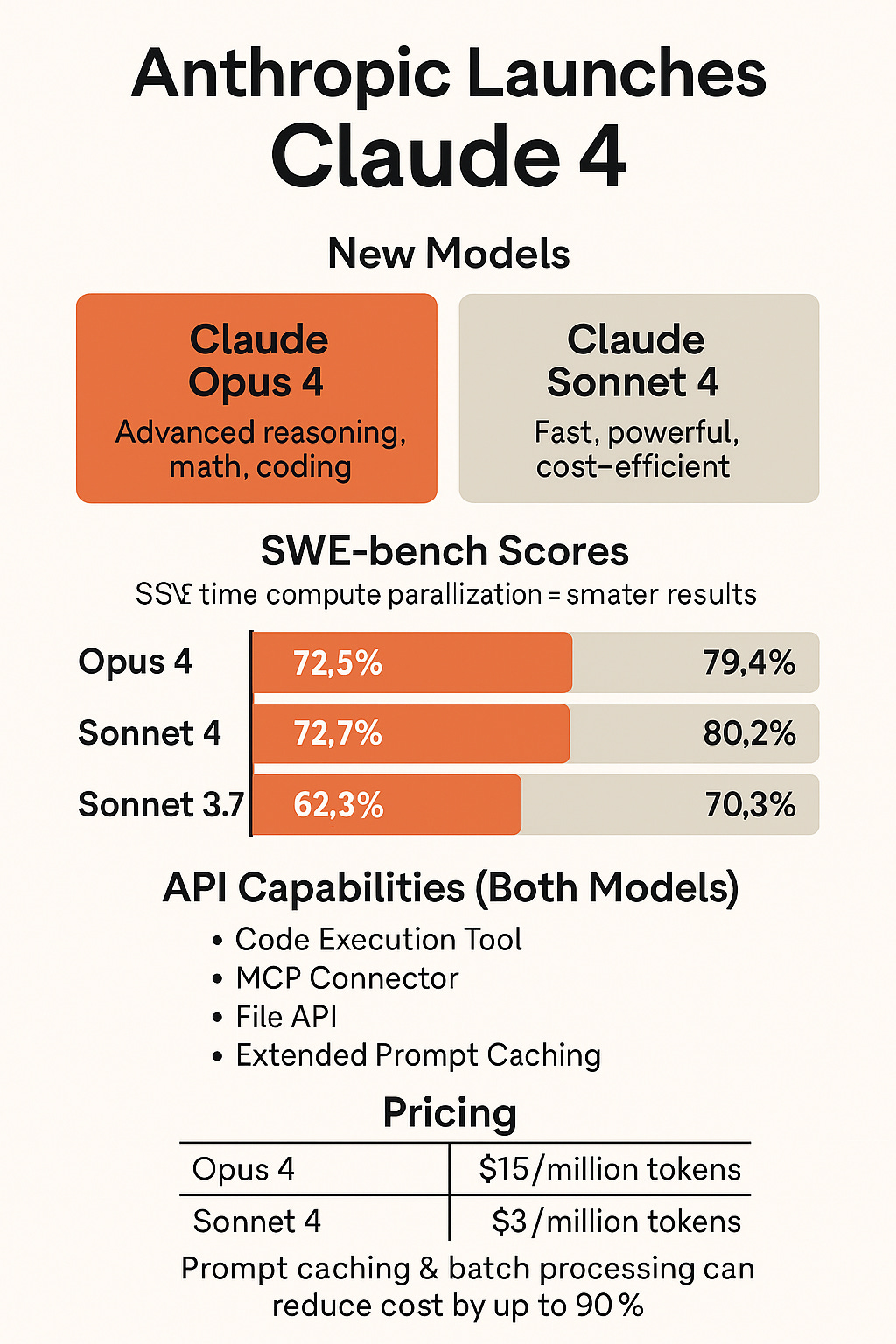Claude 4 is here and it's redefining benchmarks
Anthropic launches Claude 4 and Sonnet 4 with top SWE-bench scores, Python code execution, file memory, prompt caching, and powerful dev tools. A huge leap in AI performance.
On 22nd of May 2025, Claude 4 got officially got launched with lot of fanfare and excitement. AI Community have been waiting for an upgrade to Claude Opus4 and Claude Sonnet 4 for a while now. They didn’t just catch up—they leapt ahead. From coding and reasoning benchmarks to real-world tool use and developer features, these models signal a major shift in how useful AI can be.
In this blog, I break down what’s new, what’s genuinely game-changing, and why Claude 4 might just be the best developer AI available right now.
No Time to Read? Here's the Scoop
Claude 4 and Sonnet 4 Are Here
Two powerful new models—better at reasoning, coding, and research.
Developer Superpowers Unlocked
Claude can now run code, handle background tasks, and connect to GitHub and popular editors.
Benchmarks That Beat GPT-4
Opus 4 scores 72.5% (SWE-bench), Sonnet 4 hits 80.2% with test-time compute parallelization (splitting work across servers).
Safe and Smarter
65% less likely to take shortcuts with ASL-3 protections.
Cost-Effective
Pricing stays the same, but caching and batching can slash costs by 90%.
After months of waiting, Anthropic has delivered a major upgrade. Claude 4 isn’t just a small improvement—it’s a big leap in how AI can help with coding, research, and building tools.
Claude Opus 4 and Sonnet 4 Are Now Live
Claude Opus 4 is the most powerful model from Anthropic so far. It’s great at reasoning, math, coding, and research tasks. It even beats GPT-O3 and Gemini 2.5 Pro on many tests.
Sonnet 4 is also much better than Sonnet 3.7. In many real-world uses, it performs almost as well as Opus.
Claude’s new "extended thinking mode" lets you choose fast answers or deeper, more careful ones—depending on what you need.
Best Model for Coding?
Claude Opus 4 scored 72.5% on SWE-bench (a test that measures how well AI can fix real software bugs). It also scored 43.2% on Terminal-bench, which checks how well AI can work in a terminal (command-line environment).
Even better: if you allow it to use more computing power during answering, called test-time compute parallelisation (basically, splitting tasks across multiple computers at the same time to get better results)—Opus 4 jumps to 79.4% on SWE-bench.
Sonnet 4 beats that with 80.2% on SWE-bench, making it the top model for software engineering tasks when using this method.
Sonnet 3.7, for context, managed 62.3%, rising to 70.3% with parallel compute—still trailing both Opus 4 and Sonnet 4.
Big names like Cursor, Replit, Block, Rakuten, and Cognition are already seeing better productivity using Claude as their main coding assistant.
Claude is also performing significantly well on many other benchmarks.
Claude 4 - API Tools to enhance performance
Anthropic added four major features for developers:
Code Execution: Claude can now run Python code in a secure environment. Useful for data analysis, generating plots, and calculations.
File API: Upload files and Claude can reference them for up to 1 hour across requests—ideal for working with large documents or projects.
MCP Connector: Enables Claude to interact with external systems and APIs through Model-Controller Protocol—unlocking tool use and multi-step automation.
Extended Prompt Caching: Prompts can now be cached for up to 1 hour, letting Claude maintain memory across complex workflows without reprocessing—saving time and tokens.
Claude Code is now available to everyone. It works with GitHub Actions and popular code editors like VS Code and JetBrains.
Claude’s Pricing and Safety
Prices are the same:
Claude Opus 4: $15 for 1 million input tokens, $75 for 1 million output tokens
Claude Sonnet 4: $3 for input, $15 for output
With prompt caching and batch processing, you can save up to 90% on costs.
Claude now follows AI Safety Level 3 (ASL-3) rules:
It avoids harmful content better
It uses smart filters to detect bad prompts
It has improved cybersecurity systems
These changes also make Claude 65% less likely to take shortcuts or give rushed answers—making it more dependable.
Claude 4 brings Anthropic back into the spotlight—especially for developers who want smarter, safer, and more useful AI tools. This feels like a huge upgrade if you’ve been using Claude 3.5.
More details in their official posts: Claude 4 blog and Claude tool-use API update
Check out my previous blogs:







